Ira L. Frost
Chapter 3
1918 – 1919
US Army
At this time in the life
of Ira Frost, history was being written as a great many events were
occurring in the world. The European countries were involved in what
was the beginning of World War One. Ira was twenty-six years old, and
along with many other young men, he felt an obligation to fight for
world freedom. His desire was to join the army, but his mother and
the sheriff tried to discourage him. They thought he should wait
until drafted. However, Ira decided to enlist so he could choose his
own branch of service, as most of those who were drafted were placed
in the infantry. He joined with a group of other young men from the
community who enlisted. Many he talked to were joining the Air Force.
Ira asked an officer what the requirements were to become a pilot,
and he was told a college education was essential. The officer then
suggested the artillery as a good branch.

Ira the Doughboy
After some consideration, he decided that would be his choice, though most of the others with him chose otherwise. Before leaving, the family spent some time together at Oakley and had a family group picture taken. And then on December 9. 1917 he went to Heyburn, spent the night with relatives, and left early the next day for Twin Falls. He arrived in Salt Lake City, Utah at 10: A.M. on December 11, and toured the city. While in Salt Lake City, he received his Patriarchal Blessing from Hyrum G. Smith, the Church Patriarch on December 13th.
However, he had his troubles, as the inoculations, vaccinations and examinations didn't agree with him. Shots in each arm swelled so badly he could not remove his clothes for three nights. It was impossible to get his jacket off. He spent Christmas eve at the post. His company had a Christmas party, a movie and a Vaudeville show at the YMCA. Christmas Day he climbed up to the "U" on the hill up above the university of Utah, then returned for a big dinner. There were fellows from all over the country and Ira was starting to see the ways of the outside world. He received his uniform on the day after Christmas but the jacket needed to be altered.
On December 28, he left for Douglas, Arizona for assignment with the 11th Field Artillery Regiment, arriving on December 30 at 10:00 A.M., after which he received his equipment and attended a drill. The first night was miserable! The weather was cold and they had no stove in the tent and no straw for their mattresses. Ira finally located a tent with a stove in it so all of them stood around it trying to keep warm. It was a tired and sleepy bunch of soldiers who answered the 6:15 A.M. drill that next day. On New Year's Day they found a stove which they set up in their tent. They were awakened shortly after midnight with soldiers blowing bugles and all sort of noises celebrating the New Year. Since this group were still in their quarantine, they were unable to attend the occasion, but the corporal took them to the races and a football game, being certain they did not come in contact with the others.
Then followed days of
drill, first-aid instructions, a terrible wind, sand storms and snow.
An epidemic of diphtheria, quarantines, and being in the hospital
added to the misery. Ira had a sore arm that would not heal and then
a bad cold for which he had to be hospitalized. And there were more
foot drills, a sixteen-mile walk for target practice, firearm
sessions, general inspections, and, of course, guard and K.P. duty.
He suffered through more inoculations and the death of one of his
buddies. He exercised the horses, cleaned harnesses and oiled and
packed saddles. Ira's skills in horsemanship proved to be an asset,
particularly during the "no saddle or bride" drills. Some
of the in-experienced men were thrown off and hurt. 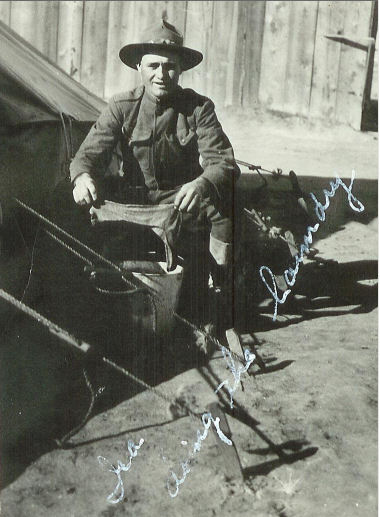
Ira doing his laundry
Payday looked good,
however and amounted to $39.00. And despite the busy schedule and
cold hard winter, they still had time for various recreational
activities, such as movies, trips to the YMCA and writing home. Ira
always enjoyed boxing and his buddies noticed this. . . . so on one
occasion while watching a match, he suddenly became the center of
attraction. The first thing he knew, they were tying the gloves on
him and no amount of protesting would persuade them otherwise. They
were kind enough, however, to pick another fellow about his size and
shoved them both into the ring. The first punch smashed Ira in the
ribs and broke one. While in a clinch, his opponent asked him if he
had hurt him. Being proud, Ira said no. The rest of the fight Ira
dodged and tried to cover and then scored hits only on top of the
fellow's head. Later he found out this man was from Salt Lake City
and was the feather-weight champion of Utah and the bantam-weight
champion of the Northwest.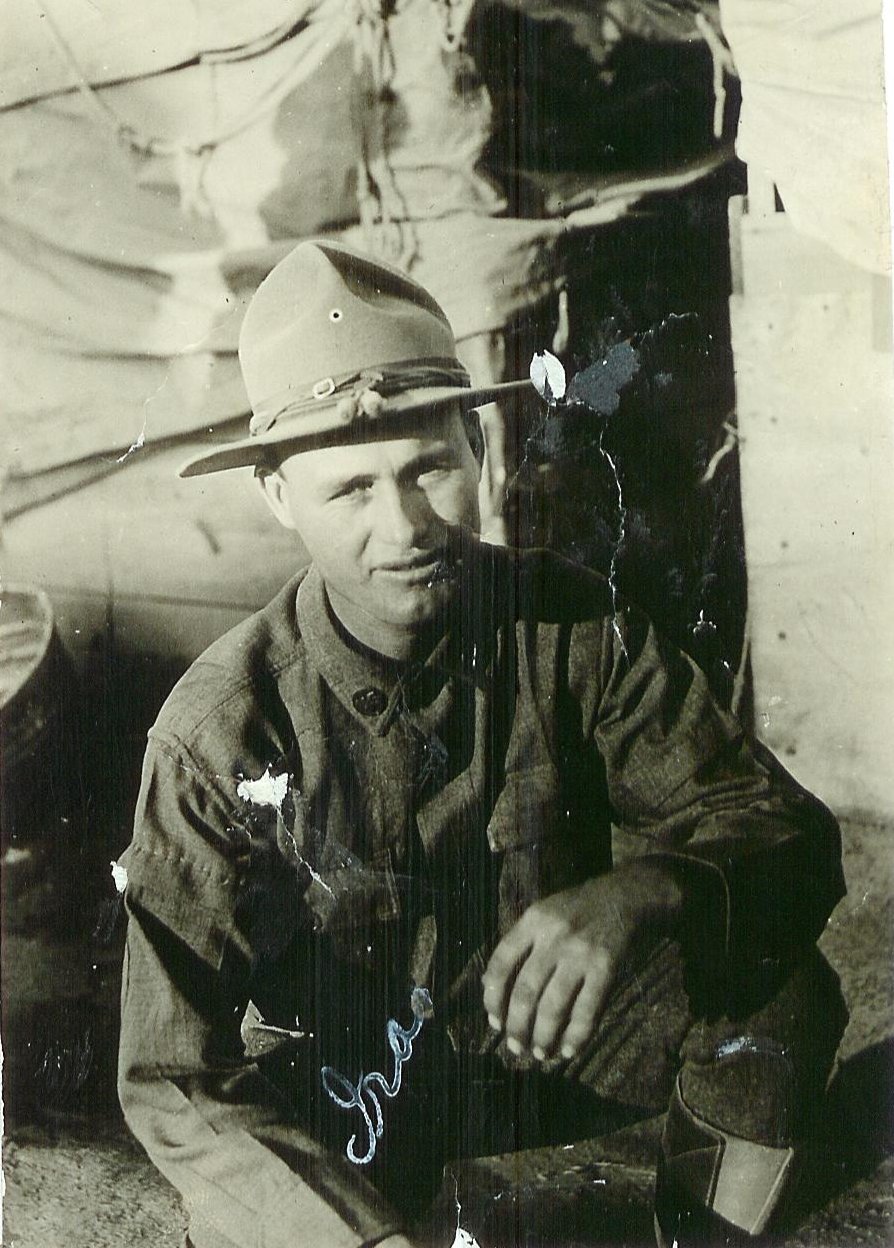
One man in their outfit was nicknamed "Hardboil". He had served time in prison at Leavenworth and had developed quite an art with a pick, juggling and swinging it around his head. He was always in some trouble and once pulled a gun on a fellow. They often had to put him under guard. He finally went A.W.O.L., but they didn't bother to go after him, as it was a relief to be rid of him. Seeing situations such as this helped Ira to realize even more the value of his background, family and religion.
On April 24, they
received orders to pack their barrack bags and to prepare to move
out. With a warm send-off from the townspeople, they left by train
and traveled all day, stopping once for an exercise
drill. The trip was pleasant
for Ira, as he enjoyed farm land, trees and country foreign to what
Arizona had. They arrived at Fort Sill, Oklahoma on the afternoon of
April 26, 1918, joining sixty-thousand other soldiers. After they
became settled, they were pleased to discover life was more pleasant
than at the previous camp. May and June were spent with more drills,
inspections, rifle and target practice, guard and K.P. duty. The
recreation included baseball games, swimming, foot races and movies.
The troop train that Ira rode cross country on
On July 6, 1918, they left Fort Sill and headed east, stopping in
Kansas City, where the Red Cross served refreshments. They passed
through Illinois, Niagara Falls, New Jersey, and to Camp Mills. In
the towns and cities they passed through, the people care to greet
the troop train, cheer the soldiers and bid them farewell. On July
13, 1918, they broke camp, boarded the transport ship "Carolina",
and were on their way to England. 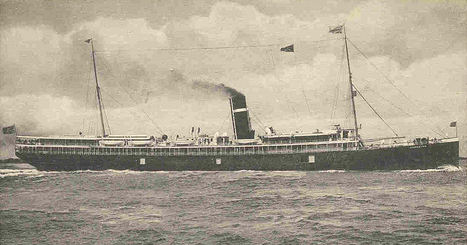
The RMS Carolina
On July 26 they landed at
Liverpool, England and boarded a train for camp. The following day
they marched to still another camp. On August 1, 1918, they marched
to South Hampton and crossed the English Channel on a transport, the
S.S. Londonderry. The
following days were spent hiking, traveling by train, and finally
stopped and were stationed in barns on French farms. They rested and
listened to battle stories told by the local people. While just
"strolling" one Sunday, Ira discovered a little church in a
grove and attended the services.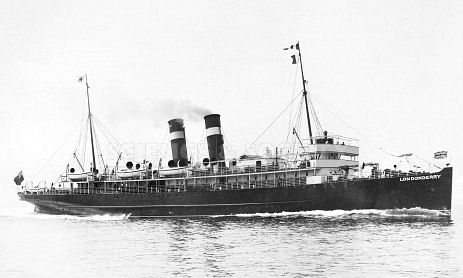
The S.S. Londonerry
The army baths were
quick and cold. A group of them undressed, then the water was turned
on them. Even though they soaped down quickly, the water was usually
shut off before they could rinse. The army made sure they had regular
"cootie baths" to rid themselves of the little pests.
During the next few weeks, most of their time was spent on maneuvers,
both day and night, and up to the front lines. They were in such
places as Etalans,
Besancon,
and Camp
du Valdahon.
He saw ammunition supplies where bombs and other explosives were
kept. Huge nets had been stretched over these storage areas, the
object being to catch the enemy bombs that were
dropped before they could explode into the ammunition. He saw enemy
bombs caught in the nets. It seemed to be quite effective for the
type bombs of that time. 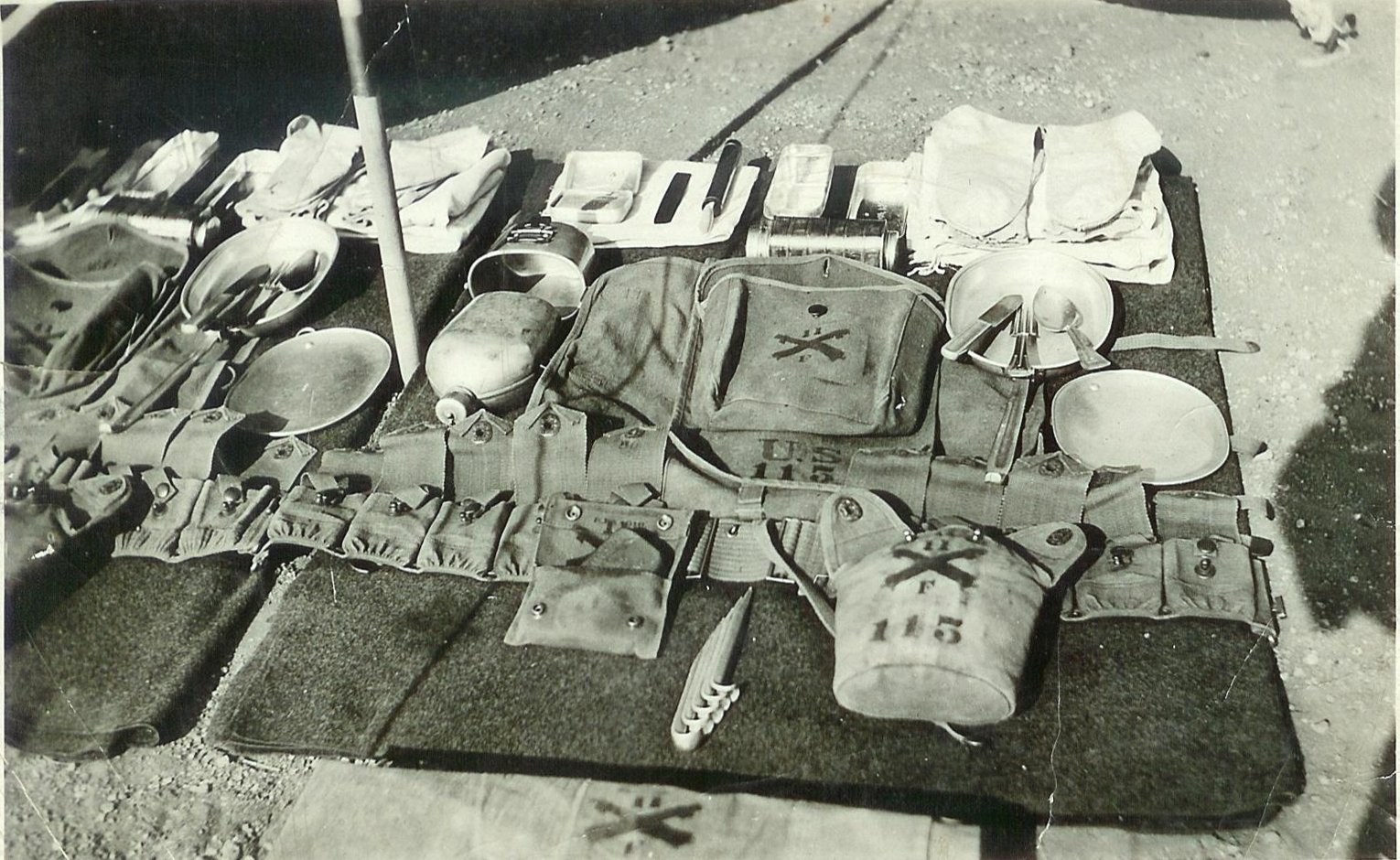
Ira's equipment laid out for inspection.
For his birthday on September 11, he was issued his heavy underwear. What a way to celebrate: About this time, he sent home a letter in in which he included the following verse:
Little you'd care what I laid at your feet, Ribbons, or flowers, or shawl . . . .
What if I brought you nothing, my sweet? Nor maybe come home at all?
Oh, but you'll know, brave heart, you'll know; Two things I'll have kept to send . . .
Mine honor, for which you bade me go, And my love, my sweet love to the end.
Ira was a marksman,
especially with a pistol. In their spare time the soldiers set
up
various targets and competed against one another. They often used
quarters as targets by placing them in the branches of trees or by
flipping them into the air. They finally refused to use their money
as a target for Ira, for after he shot, they never saw the money
again. An officer made arrangements for him to compete in a marksman
contest, but he never did get the opportunity to do so. Unofficially,
however, he beat the world record while shooting a certain caliber
gun (size not known). The following letter was written by Ira to his
mother. The punctuation and spelling are just as he wrote it: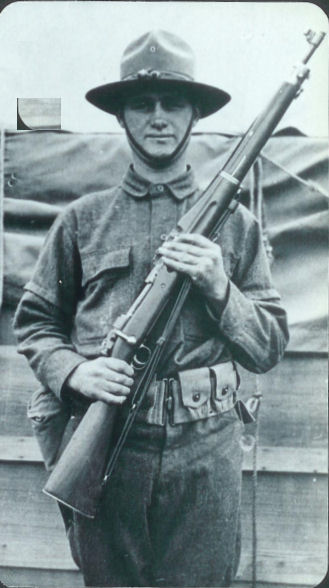
In full combat gear
July 2 . While I sit here Mother Dear riting this I am thinking of your dear old face and how glad I'll be to get back and see you once more. While I rite I'll draw you a picture of myself here if corpal will leave me here long enough. I'm sitting with my back to the wall on the ground. On the east side of the 3rd relief tent in the shade. With my riffel belt on and my riffel at my right side leaning up against the wall and the boys of the same relief are inside sleeping, or trying to and waiting for the prisonors to call for a centrie till it comes our turn to go on post. It is about 7:30 p.m. so when you read this you will know what I was doing and I just got back from chasing a prisonor. I hear they found 7 spys in the 78 F.A. part of our Bregade this week. I dreamed today noon while napping I was home and was wrastling Cora. I told her she was going to mall me and I was spank-in her. The first time I've dreamed of being home with my uniform since I left there .
Army life and living
conditions were rough. Ira suffered a lot of hardships such as cold
weather, long hours on guard duty, moving guns to new positions, and
other such duties. In October he reports of guarding the guns,
building targets, and taking his turn at guard duty in cafes and even
in the urinal. He tells of seeing four German planes flying overhead,
and the report that three of them were shot down. They hiked and
slept wherever they could.... At one time they were loaded onto a
train, then found they could not travel because of air attacks during
the day as well as at night. The weather was cold and foggy, making
travel difficult. He was not yet on the firing lines, but within the
sound of it. They traveled mainly at night finding a little time to
sleep in boxcars or anyplace they could lay down a few minutes. They
had rations to eat and didn't stop for regular meals, still traveling
on foot at night. He was in enemy shellings, but never hit. Ira
arrived at the front firing lines at 8:00 a.m. on October 26. He
tells of seeing shell damage, shooting down an enemy balloon,
sleeping in an old abandoned dug-out and doing K.P. duty.
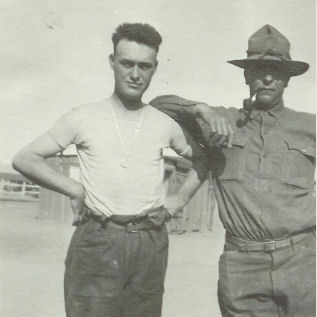
Ira and an army buddy
These were the days of the German's last struggle to win the war. Ira saw men killed, was in heavy enemy fire, returned the fire, moved up to new positions, camouflaged the guns, and all in cold rainy weather. One night they hiked from 7:00 p.m. till 5:00 a.m. the next day, then slept a while, had breakfast, and hiked again until 5:00 p.m. and rested till dark and hiking again all night. Shells were exploding close by. They found an old abandoned dugout at Romans where they slept a few hours. They opened up a barrage of firing from three in the morning till ten that day, The first days of November, the American troops were advancing rapidly.
These were days Ira
would remember all of his life. He was on duty at Remonville
for twenty four hours, then hiked till he found an old torn down
house at Nework where he slept with his overcoat and slicker on. They
were now able to see the actual retreat of the enemy, and he stated
on November 4
in his
diary: "The Huns are plum out of reach: Other diary entries. . .
November 5:
"Was
shelled terribly at BoClair..six men"...."One man
killed in Battery A...terrible shelling, slept in the rain....in a
new position at Junnaville. November 9:
"Opened
up a barrage." They received word that peace was not far off,
which excited all of them.

When word finally came
to cease fire on November 11, 1918, they were camped at a saw mill.
The Eleventh Field Artillery fired a eleven gun salute at 11: a.m. on
the eleventh day of the eleventh month...and the war was over!! One
fellow in Ira's outfit gathered some hand grenades and was exploding
them. Until they discovered the source of the fireworks, they thought
maybe the Germans had opened up a new offensive. But the war was
really over and it was a joyful time, and everyone was anxious to
return home. According to Ira's diary, these days may be summarized
as follows: Many items were being burned causing many fires and lots
of smoke. Everyone was hunting for souvenirs to take home. Ira joined
in the search but somehow he had lost his bed roll
and took a long hike to the salvage dump to find another one. Mail
call brought nine letters! Cleaning up and policing the area, writing
letters, hiking, going into Lunnaville and Stanay, were some of the
activities of those days.
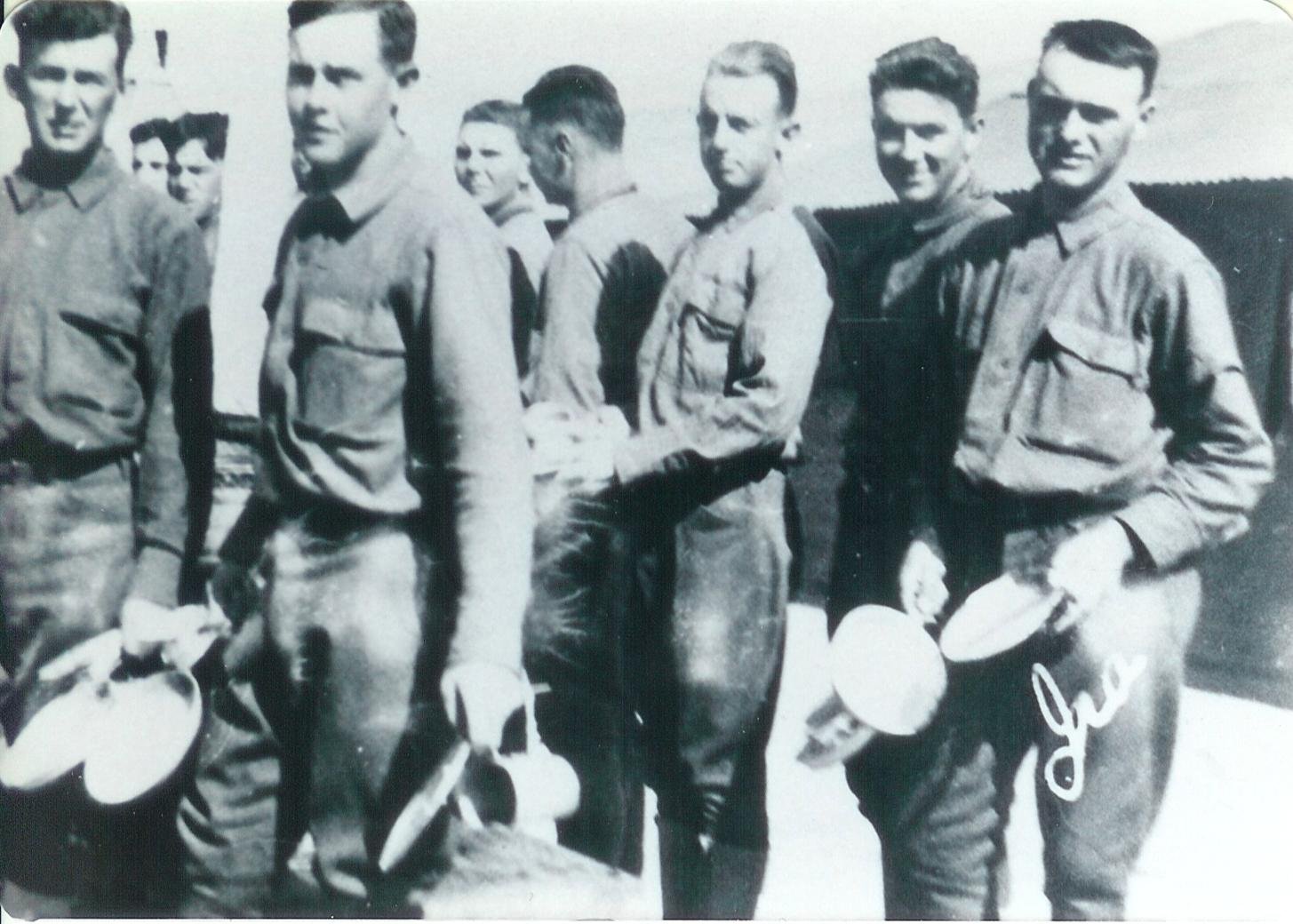
Ira (right) standing in the chow line.
Thanksgiving services
were conducted by the Chaplain. There was a concert and other socials
to attend and a walk to a nearby community show. About December 10,
they moved out, stopping in various towns along the way sightseeing.
Ira was suffering chills and high fever due to the cold rainy
weather. He attended church services whenever possible. These
services were of a non-denominational nature and conducted by the
Chaplain. Regardless, he knew the value of receiving a spiritual
message to help him stay close to the Lord. He spent Christmas
preparing items to mail home, reading letters and opening packages he
had received from loved ones. However, he was still in the service
and had responsibilities such as drills and guard duty. Christmas
dinner consisted of wild hog, guinea hen, chicken, duck, cake, pie,
corn, spuds, gravy, chocolate and other candy. It was quite a treat.
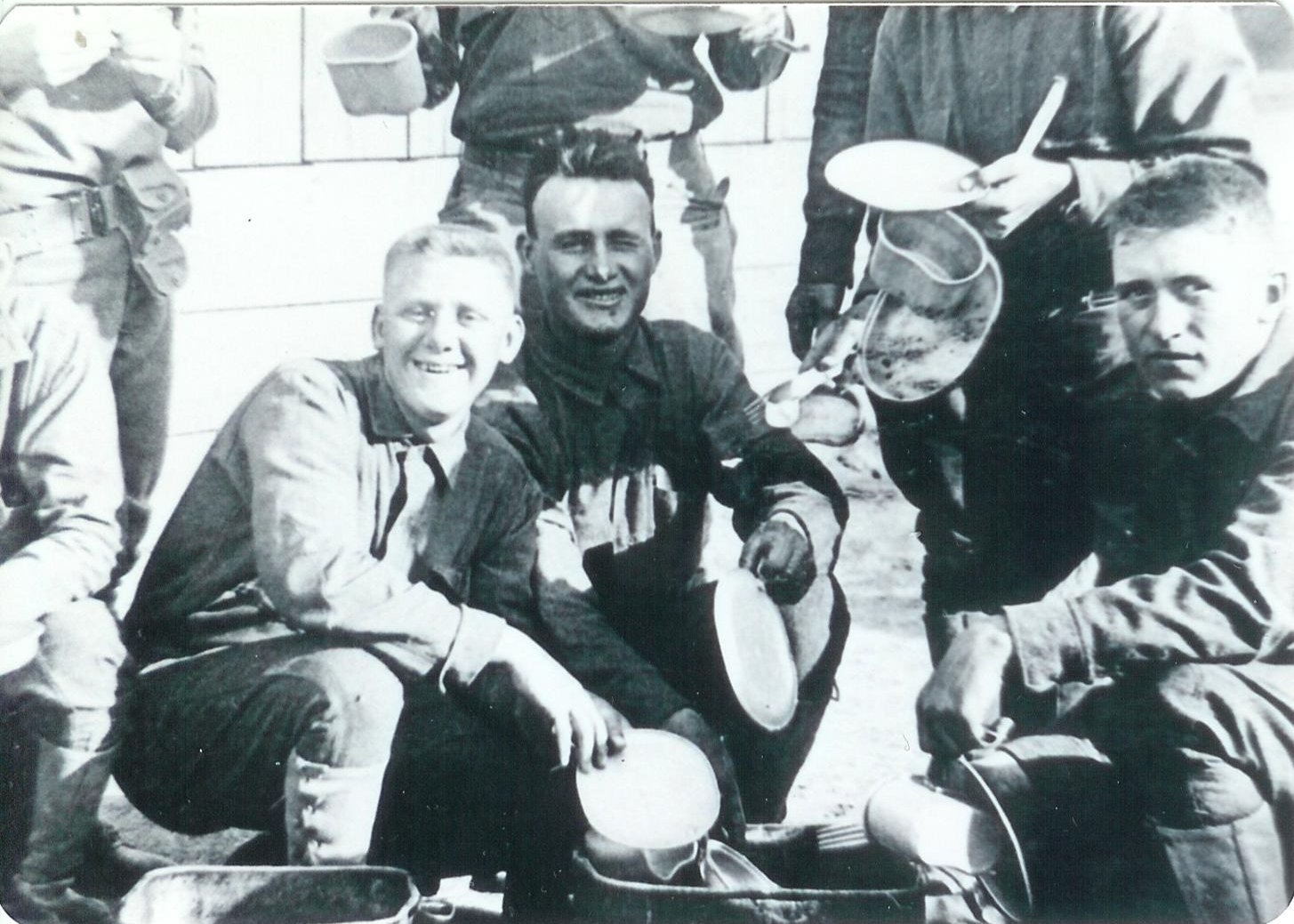
Ira (center) ready for some army chow.
He became friendly with some of the French people and studied the language from one of the Madamisell's. Between army responsibilities, they visited towns and had parties in the homes of the French Mamas. One French Mama Ira talked about said she liked him because he wasn't rowdy like some of the other soldiers. She said when they came inside the door, she could tell by the kind of language whether it was Ira or his buddy, Carl, because Carl used profane language. Another family always told their friends about Ira, that he never had a cognac or a mademoiselle, nor mixed up with the French girls or drink liquor. He was fond of a family named Frag and mentioned them several times in his diary. February and March he had target practice, dances, lectures, Sunday services, movies, guard duty and also visited old castles. He competed in a Battalion pistol contest, leading the battalion by ten points and coming out seventh best in the Regiment.
Ira had put in for
discharge and was preparing to go home. In April he spent time at
three different camps and met two fellows from home, H. Lee and
Shorty Owens. It was a great day in Ira's life when he got his orders
to go home. On June 2, 1919, he boarded the USS Mt. Vernon and left
port at noon. They experienced some stormy weather, which didn't help
with the sea sickness. He spent his time walking around the ship,
participating in exercises and boat drills. Meals were served at six
in the morning and six in the evening with sandwiches at noon. On
June 10 at 10: a.m. they docked at the New York Harbor at Pier # 30.
Even though the war had ended several months previously, they were
met by crowds of people and received a hero's welcome home. On hand
to greet them was a band, the Salvation Army, the Chamber of Commerce
and the YWCA. The Red Cross treated them to pie and ice cream. What a
proud feeling Ira must have experienced to know he had done his part
in defending his country and had now returned to the United States.
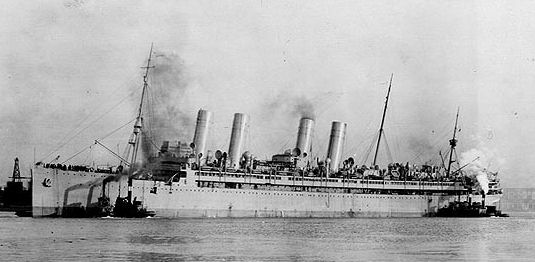
USS Mount Vernon
After a ferry boat ride from Long Island to New York, they went by train to Fort Mills, where they were served a dinner and had a "delousing". They boarded another train for the trip across country. At each stop they were met by cheering crowds of people who welcomed them home and passed out treats to them. After the last papers were signed, equipment all turned in, and several lectures, Ira was finally discharged and on his way home. He arrived in Pocatello, Idaho about noon and was in Minadoka at 2:00 p.m. After bidding farewell to his buddies, he left for Burley. Arriving there, he called his mother in Oakley and spent the night with his sister, Cora. The next day, June 24, 1919, he arrived home. How wonderful it was to greet his family and friends once again, to visit and renew old acquaintances and to just relax!
Chapter 4
The 11th Field Artillery in World War I